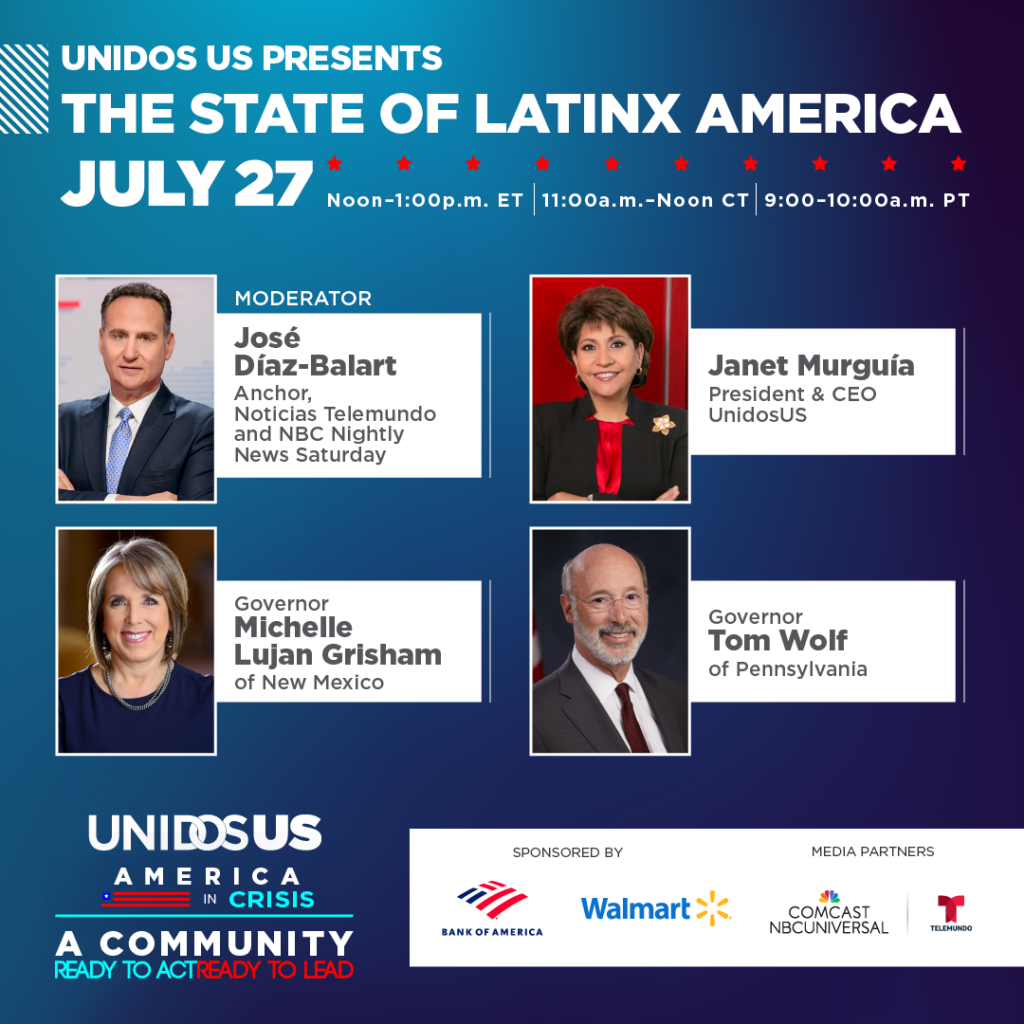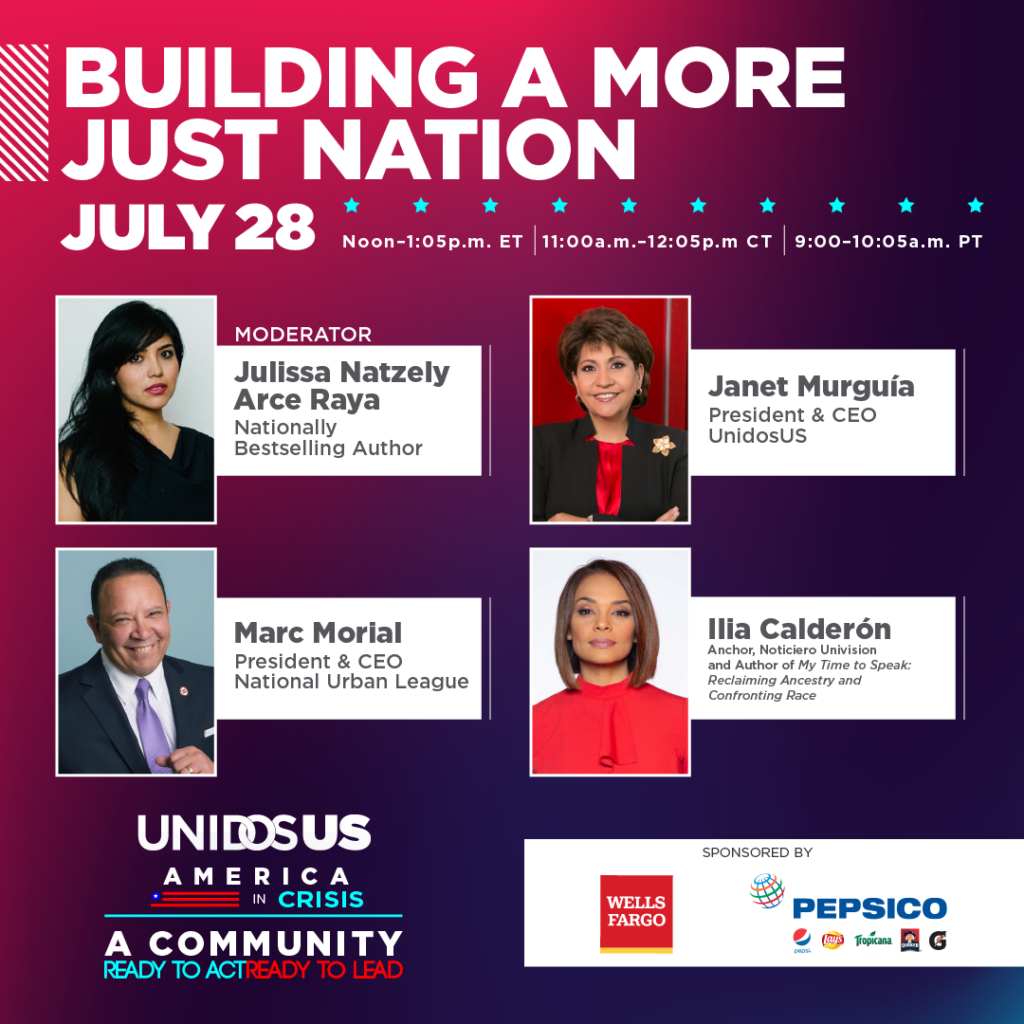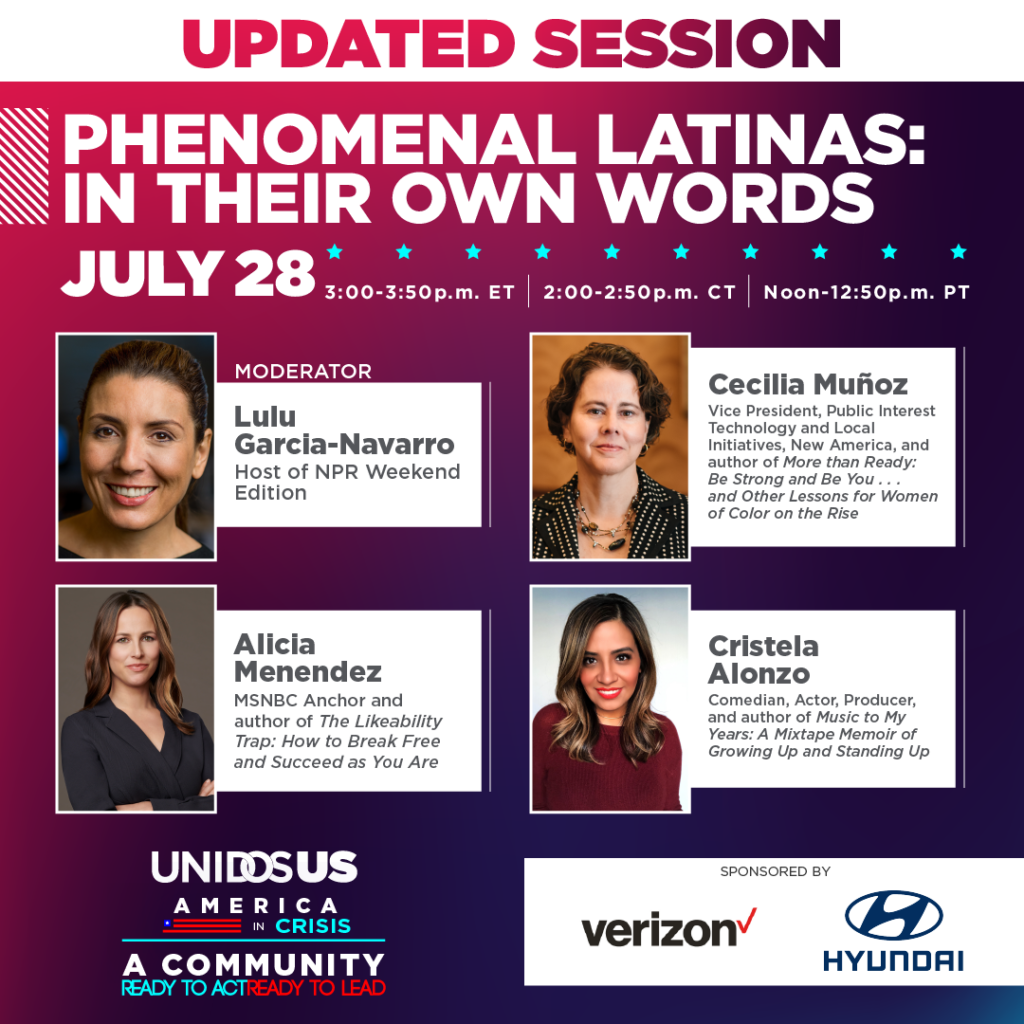We examine the state of Latinx America in our first-ever virtual Conference
“The state of Latinx America is troubling and precarious,” said UnidosUS President and CEO Janet Murguía during her introductory remarks at the 2020 UnidosUS Annual Conference. “We’ve been absolutely decimated by the COVID-19 pandemic and the resulting economic crisis.”
Latinos are overrepresented among the sick and dying and are more likely to either work in essential jobs or have had their hours cut since nationwide quarantines began in March. Every year, UnidosUS holds a Conference and gathers together Latino leaders from across the country. This year, due to COVID-19, we were unable to meet in person. As a result, we held our 2020 Annual Conference and Virtual Marketplace entirely online.
More than 5,000 people registered for our Conference and attended sessions on the impact of the COVID-19 pandemic and the fight for racial justice. Attendees not only heard from leaders across the country, they also engaged in meaningful discussions with other advocates.
You can watch any of the 2020 Annual Conference sessions online and on YouTube.
We kicked off the Conference with a session featuring UnidosUS President and CEO Janet Murguía, Governor Michelle Lujan Grisham of New Mexico, and Governor Tom Wolf of Pennsylvania, moderated by José Díaz-Balart, the anchor for Noticias Telemundo.
Murguía began by outlining how Latinos has been disproportionately affected by the COVID-19 pandemic. “We’re at greater risk for this virus and we’ve seen what this means for our community.”
Governor Lujan Grisham stressed the importance of investing in public health, explaining that the United States has weathered public health crises since as recently as Ebola in 2014. “If you care about your citizens, you plan,” she said.
Governor Wolf explained how his decisive leadership has made a difference in Pennsylvania, but how there is still a lot more that could be done to contain the virus: “This virus does not recognize or respect state boundaries.”
A Big, Bold Economic Recovery: A Conversation with Elizabeth Warren
As part of the Conference, Senator Elizabeth Warren joined a conversation with scholar and professor Dr. Manuel Pastor on what it would take to have true economic recovery in the COVID-19 era.
“Latino families are still paying the price for decisions made over a decade ago,” Warren explained. Indeed, during the Great Recession, Latino families lost 66% of their household wealth. This has only gotten worse during the COVID-19 pandemic, as many Latino families have fallen behind on rent, lost their jobs, or had their hours cut.
Senator Warren stressed that the only way to get beyond the crisis is to have inclusive relief for all families.
“We have a chance to come back from this pandemic stronger than before if we make the needed investments that lift up all of our communities,” Warren told Conference attendees.
“The case rate is triple for the Latinx community compared to the White community,” Dr. Barbara Ferrer, Director of the Los Angeles County Department of Public Health, told attendees in a session on COVID-19 and health in the Latino community.
Latinos are also overrepresented in essential jobs where working from home is not an option. This makes it difficult to stay home and stay safe. As Dr. Richard Besser, President and CEO of the Robert Wood Johnson Foundation pointed out during his introductory remarks for the session, the need for personal protective equipment has not been met fully, and the need is great among essential workers, particularly those who are not in the health care field. With many Latinos underinsured or lacking insurance, or living in mixed-status families, it is unsurprising that they may not seek medical care even if they need it.
“COVID-19 has really unmasked all of these disparities,” said Dr. Leana Wen, Visiting Professor of Health Policy and Management at George Washington University’s School of Public Health. “We need to work toward both short and long-term solutions.”
On the second day of Conference, we kicked off with a conversation between National Urban League President and CEO Marc Morial, UnidosUS President and CEO Janet Murguía, and Ilia Calderon, Anchor of Noticiero Univision, on addressing the current protests and how we can build a country that is more just for all of its citizens.
“Latino men are second only to Black men when it comes to police shootings and other law enforcement abuse,” Murguía explained, adding that a 2017 study showed that 78% of Latinos believe that they face discrimination in the United States. The same poll showed that roughly one in five Latinos believe that they are treated unfairly by the law enforcement system.
Calderon highlighted the way that racism has played a role in her own life as someone who is Afro-Latina, and how racism was prevalent within her home country of Colombia.
She added that racism takes many forms. “I feel for the people sitting in an office every day, listening to microaggressions,” said Calderon.
Morial stressed the importance of using the energy that has been displayed during the protests and transforming it into lasting change.
“The protests we see must carry their way into the ballot box, into the voting booth, and into the future,” Morial explained.
From Digital Abyss to Digital Equity: The Future of Work and Education
The COVID-19 pandemic has affected how we go to work and how our children go to school. In this session, Alejandra Y. Castillo, CEO of YWCA USA and Lili Gangas, Chief Technology Community Officer at the Kapor Center, gave talks on the future of education and the future of work, respectively. Daniel Loftus, President and CEO of PODER, a Chicago-based UnidosUS Affiliate, hosted the session.
In Castillo’s talk, she used her own elementary school as a case study for why Latino children and families have been disproportionately impacted by the sudden switch to online learning that happened in March.
Gangas also referenced her own experience as a first-generation American, explaining that her mother’s sacrifices when she was growing up inspired her to become an engineer and pursue a career in STEM—one where Latinos are underrepresented.
¡Adelante! Progressive Power in the 2020 Elections
This was always going to be a critical year for our future, and both the pandemic and the ongoing fight for racial justice have only made the upcoming election even more vital. In this session, Congressman Ruben Gallego, along with Eliazar Posada, Director of Community Engagement and Advocacy at UnidosUS’s Affiliate El Centro Hispano; Angelica Razo, Texas State Director, Mi Familia Vota; and Clarissa Martinez de Castro, Deputy Vice President of Policy and Advocacy at UnidosUS, gave attendees key facts about the Latino electorate and explained what they are seeing in terms of engagement on the ground in their communities.
“We know that the coronavirus pandemic has impacted voter registration efforts,” Martinez de Castro explained, adding that this made the conversation even more timely for the attendees of the session, some of whom work on voter registration in their own communities.
At El Centro Hispano, they have worked with many first-time voters, some of whom are the first person to be eligible to vote in their families. And while, as a nonprofit, El Centro cannot tell anyone who to vote for, Posada explained that they still tell people what to think about when they’re voting. “You should be thinking of your family, your community, of the resources that you need,” he explained.
Congressman Gallego also gave the perspective of an elected official up for reelection in an uncertain environment. “Because of COVID-19, it’s harder for us to make that person-to-person contact, which is what we rely on,” he told attendees. This is significant when one considers the fact that Latinos are nearly twice as likely to vote or vote early when they have been contacted personally by a campaign or a candidate.
The COVID-19 pandemic has also led advocates to look to how other states manage their elections. “What can we change immediately? What can we change in the long term?” Razo said of her home state of Texas.
Phenomenal Latinas: In Their Own Words
Traditionally, during the UnidosUS Annual Conference, we hold the Latinas Brunch, where we spotlight powerful Latina leaders and their accomplishments. This year was no different, as we hosted three Latina authors—Cecilia Muñoz, Alicia Menendez, and Cristela Alonzo.
Alonzo’s book Music to My Years: A Mixtape Memoir of Growing Up and Standing Up highlights her own experience growing up in an immigrant family and pursuing a career in comedy.
“When I was a kid, I thought my childhood was like everyone else’s,” Alonzo said, explaining that it had taken years to realize how desperately poor her family was—at one point squatting in an abandoned diner until she was seven years old. While she describes her struggles, she also explains that she was able to celebrate her heritage and eventually bring a Latino story to television.
Menendez’s book The Likeability Trap: How to Break Free and Succeed as You Are sparked an important discussion about how women are perceived in the workplace. Quoting Cecilia Muñoz, she said, “Latinas have a PhD in graciousness.”
“I think there’s this sense of ‘if we talk about it, we’re admitting weakness,’” Muñoz explained about her own book More Than Ready: Be Strong and Be You…and Other Lessons for Women of Color on the Rise.
Muñoz went on to tell a story about a young woman who was told at 23 during an internship that she was not “management material.” She later told Muñoz how valuable it would have been to have a circle of people to tell her: “Don’t let it knock you off your game.”
Corporate Experience
The Conference ended with two Corporate Experience sessions, one on diversity and inclusion, and one on how to reopen America safely, and included eight breakout sessions for more focused conversations on topics ranging from how to reopen schools safely and how to best support small businesses during the pandemic.
Our Conference typically includes sessions for working professionals, and these sessions took into account how work has changed since the outbreak of the coronavirus earlier this year.
This is a critical year for our community, and it is important for Latinos to get counted in the 2020 census and get registered to vote in November if they’re eligible. You can learn more about what UnidosUS is doing to get the community engaged in the political process this year at AdelanteUnidos.com.
You can watch the rest of the 2020 UnidosUS Annual Conference at conference.unidosus.org.




